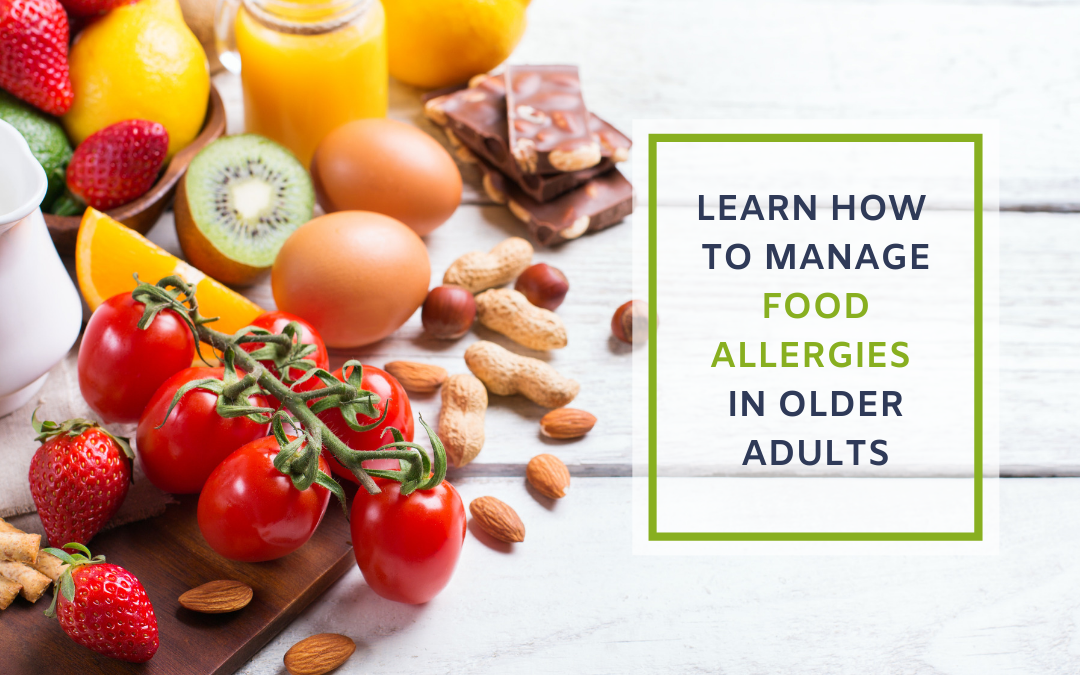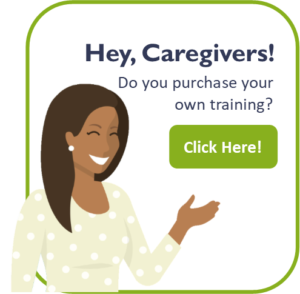When you hear about food allergies, you may think of a
peanut-free lunchroom at your child’s school.
Food allergies commonly affect infants and children.
But, did you know as many as 1 in 10 adults over the age
of 60 have food allergies and half develop them later in life?

We asked food scientist, Beth Scholer, CC, CDM, CFPP
from Caregiver’s Kitchen to provide some tips on
keeping elders safe from food allergies.
Here’s what she told us:
Caring for someone with food allergies is all about management. There is no cure, and the only proven treatment is to avoid the allergen food. Even the smallest amount of
Common Food Allergies
In the United States, eight foods are commonly known to cause food allergy reactions.
Milk, eggs, wheat, soy, fish, shellfish, tree nuts, and peanuts cause about 90% of reactions.
Many other foods have been known to cause reactions, but it is important to understand the difference between a true food allergy and
You Can Help Prevent Reactions
As a caregiver, carefully handling and preparing an elder’s food will help keep them safe from an allergy reaction. Follow these tips when preparing meals for an elder with food allergies.
- Wash hands between allergen and non-allergen foods.
- Designate an (allergen-free) apron or wear clean clothes when preparing food for someone with an allergy. This is really important if you are visiting more than one client during a shift, as clothes can cause contamination.
- Separate allergen foods in the grocery cart, in the pantry or refrigerator and on the cutting board. Even the smallest amount of protein from an allergen food can cause a reaction in someone who is very sensitive.
- Wash (with hot soapy water) and rinse all cooking utensils and surfaces before and after each use (knives, cutting boards, and countertops)
- Keep menus simple; don’t use ingredients that may be hidden sources of allergens.
- Read food labels carefully; the eight common foods must be labeled.
If the elder is eating away from home, follow these guidelines:
- Remind elders to inform friends or family of the food allergy if invited to dine at their home. Consider taking “safe food” if the allergy is very severe or if the elder may become confused and eat an allergen food.
- If visiting a restaurant, check the menu before arriving for safe options. Inform the server of the allergy and help the elder choose a dish where there is little chance for cross-contact.
- Avoid buffet-style or family-style restaurants because the chance of cross-contact of ingredients is much higher.
Have a Plan
- Even with careful management, reactions do happen. Have a treatment plan in case of an allergy reaction. Reactions can be life-threatening! This may include using injectable epinephrine and seeking medical attention. Work with the care team on the best course of action.
Be Symptom Aware
A food allergy reaction affects the immune system, and symptoms can range from mild irritation to life-threatening.
They can involve the skin, eyes, mouth, respiratory or cardiovascular system, or gastrointestinal tract and are often mistaken as side effects from medication, autoimmune disorders, digestive problems, or caused by aging in general.
Here’s a list of symptoms that may be caused
by a food allergy reaction.
- Hives or skin rash
- Itching of the mouth, throat or eyes
- Wheezing or hoarse voice
- Nasal congestion
- Trouble breathing
- Abdominal pain or diarrhea
- Nausea or vomiting
- Swelling in air passages
- Dizziness or fainting
- Severe drop in blood pressure
- Loss of consciousness
If you care for someone with a known food allergy, additional training is essential to learning best practices for protecting them from a reaction.
Want more tips like this?
Subscribe to the intheknow online learning library today to gain access to Chef Beth’s courses and a whole lot more! Plus, you’ll get plenty of tips and Chef Beth’s recipes searchable in the intheknow-on-the-go WIKI.
And for a limited time, get a $10 OFF your first year’s subscription!
USE COUPON CODE: HEYCAREGIVER10



